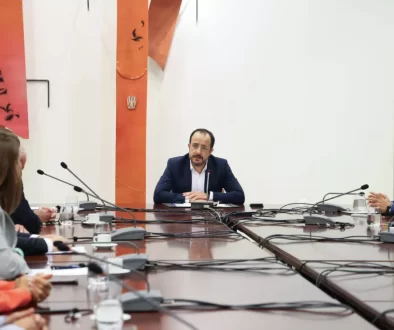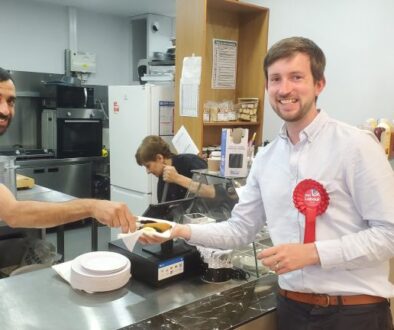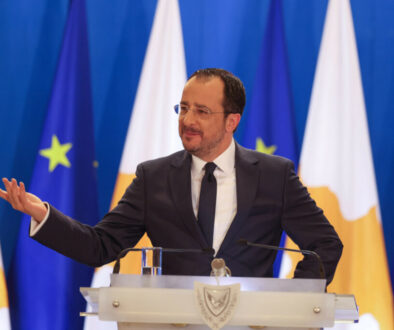Juncker: The “south” was “the main problem” in Crans-Montana but there is hope for a “reconnection”

In an interview to the Cyprus News Agency (CNA), on the occasion of the recent anniversary marking 20 years since Cyprus joined the EU, Jean-Claude Juncker, former President of the European Commission, said he believed that “neither Erdoğan nor Akıncı but the south” was “the main problem” in Crans-Montana. But he went on to explain why he doesn’t think all hope is lost for “a reconnection” between the two sides.
“If we find ways to reconnect on the Cyprus issue with Erdoğan, then there will be chances because the President of the Republic has the will to see it through to the end.”
Everyone should have invested more in the Cyprus issue during the last negotiation process, as it was “the last truly useful period” during which, though, the Greek Cypriot side “was not ready to make the leap,” said Mr Juncker.
Speaking to the Cyprus News Agency (CNA) from the office he still maintains at the Berlaymont, the headquarters of the European Commission in Brussels, Mr. Juncker, when asked about his statement in an interview after the end of his term, in which he mentioned that the failure to resolve the Cyprus issue was one of the goals he regretted not achieving, noted that he still wonders why certain things happened or did not happen.
“I was convinced that this period,” he noted, referring to the last round of negotiations that ended in 2017, “was the last truly useful period. We should have invested more, all of us.”
“I had high hopes it would work after the completion of the cheese agreement. If it was possible to bring the President of the Republic and the leader of the Turkish community in the north to the negotiating table on a technical issue, everything would be possible,” he continued, emphasizing that he had good relations with both President Anastasiades and the former Turkish Cypriot leader.
Erdogan was more positive at that stage
“I was disappointed that afterwards things became more difficult than before, I never understood that” he continued. Explaining why he believed that progress was possible during that period, he said, “I had talks with Erdoğan, who was more positive during that time than previously. When I spoke to him as Prime Minister and at the beginning of my presidential term, he would foam at the mouth when we discussed the Cyprus issue. And suddenly, he became much more accommodating and open-minded about putting an end to this drama.”
According to Mr. Juncker, this was a last chance as “my impression, having spoken to many, mainly young Cypriots, was that the youth in Cyprus were distanced from the issue because they had grown up” in “this ‘dead’ situation, they didn’t really suffer, they were losing interest” in a solution. As he said, what he told his team was that the effort had to be made now because “in ten years from now, the young people in the south of the island will not be prepared to make compromises.”
“I believe that the main problem was neither Erdoğan nor Akıncı, but the south of the island, because it was not ready to make the leap,” he continued, reiterating that he was disappointed as “I invested a lot of my time in this issue, having bilateral contacts.” Referring to the leadership of the Greek Cypriot side, he noted that “although I like and love those in the south, they did not make enough efforts to explain that this was the moment for the leap, and neither did the other political parties on the island.”
He further pointed out that “our goal and purpose through the proposals we have submitted is the creation of a truly independent and sovereign state, free from any dependence on third countries. A modern state, fully aligned with the European acquis, that will provide the prospect of peaceful coexistence and a perspective for all its inhabitants without exception,” he stated, emphasizing that “we remain committed to the UN processes and to what has been agreed upon so far.”
Moreover, the current President of the Republic and then Government Spokesperson, Nikos Christodoulides, had stated after the Conference that the real reasons for the failure in Crans-Montana were none other than Türkiye’s insistence on continuing its guarantor and intervention rights in Cyprus, as well as maintaining a permanent presence of Turkish troops on the island.
For his part, the then negotiator of the Greek Cypriot side, Andreas Mavroyiannis, had stated that “Çavuşoğlu (former Turkish Foreign Minister) replied that there could be no abolition of the intervention and unilateral intervention rights except after the implementation of the solution and a security period of 15 years.” Regarding the troops, he noted that the Turkish Foreign Minister “said they would accept a substantial reduction, but the remaining troops would stay in Cyprus indefinitely.” “That was what blew things up,” he added.
Τhe UN Secretary-General, António Guterres, who was present during the final phase of the Conference in Crans-Montana, had stated after its closure that “there were differences on a number of issues between the delegations participating” in it.
“It is clear that there is still a significant difference between the delegations regarding a certain number of issues, and therefore it was not possible to reach an agreement,” he stated. He also expressed his gratitude to the two leaders “who wish the best for all Cypriots,” the representatives of the guarantor powers, and the EU.
Current efforts for a solution
When asked whether he believes that the hopes for a solution have vanished, Mr. Juncker said, “I wouldn’t say that” and mentioned that he had a long meeting with the new President, the “new Nikos,” as he jokingly said, adding that “he is a man of good will and an excellent leader.”
He emphasized that there must be a reconnection of the two sides, Türkiye and Greece, as all these partners have a role in this conflict.
Asked to comment on Türkiye’s stance regarding a two-state solution and its attribution, Mr. Juncker pointed out that this is a period of “preparation for future negotiations” and that he would not take today’s statements “too seriously.” However, he emphasized that he believes “Erdogan has the power to complete” and that “he is the one who decides in the northern part of Cyprus, which is very uncomfortable for us because we do not like the idea that a foreign power has the initiative in the negotiations.”
“Without Erdogan, nothing is possible. I think that if we find ways to reconnect with Erdogan on the Cyprus issue, then there will be possibilities because the President of the Republic has the will to go all the way,” he added.
Enhanced EU involvement
Asked to comment on ideas for enhanced EU involvement in the process, Mr Juncker said the matter concerned the United Nations, which had previously surprised him as “I thought when I was prime minister that this was an EU matter”. adding that the Republic of Cyprus also considers it up to the UN to lead the process.
“Maybe things would have been easier if we had put all these issues in the hands of the EU, but I’m not sure if that would have helped,” he added.
Asked about the proposal to appoint an EU envoy for the Cyprus issue or for the EU to take an initiative, Mr. Juncker noted that he believes “the EU should be there if asked by both parties,” while also highlighting the imbalance that arises since “Cyprus is a member state and the north is a player in the room,” but “the elephant in the room sits in Ankara.”
“But I think that as far as the European Union is concerned, we should increase our efforts to act as intermediaries if we are asked,” he added, noting that the EU cannot take initiatives on its own.
Referring to another point in the talks in Geneva, in which he participated in early 2017, Mr. Juncker said that “the Turks did not like the idea that the Commission was part of that process,” and that there was tension between the Greek and Turkish delegations.
At another point in the interview, in the context of discussing the future of EU-Turkey relations, Mr. Juncker emphasized the need to continue the discussion from where it left off in Geneva and Crans-Montana. He stressed that he really believes the EU, together with the UN and at the request of the two sides on the island, “must play a role, not so much as a mediator — that would be excessive for the EU — but as an intermediary between Turkey and the Republic of Cyprus, and to some extent, Greece.”


